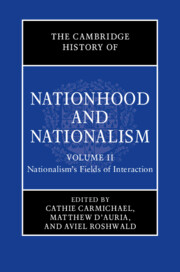Book contents
- The Cambridge History of Nationhood and Nationalism
- The Cambridge History of Nationhood and Nationalism
- The Cambridge History of Nationhood and Nationalism
- Copyright page
- Contents
- Figures
- Tables
- Contributors
- Part I Imperial and Postcolonial Settings
- Part II Transnational and Religious Missions and Identities
- 15 Liberalism and Nationalism: Trajectories of an Entangled Relationship
- 16 Marxism and the National Question
- 17 The Catholic Church
- 18 Islam and Nationalism
- 19 On Jewish Nationhood and Nationalism: A Historical Survey from Antiquity to the Establishment of the State of Israel
- 20 Buddhism
- Conclusion to Part II
- Part III Intersections: National(ist) Synergies and Tensions with Other Social, Economic, Political, and Cultural Categories, Identities, and Practices
- Index
- References
18 - Islam and Nationalism
from Part II - Transnational and Religious Missions and Identities
Published online by Cambridge University Press: 08 November 2023
- The Cambridge History of Nationhood and Nationalism
- The Cambridge History of Nationhood and Nationalism
- The Cambridge History of Nationhood and Nationalism
- Copyright page
- Contents
- Figures
- Tables
- Contributors
- Part I Imperial and Postcolonial Settings
- Part II Transnational and Religious Missions and Identities
- 15 Liberalism and Nationalism: Trajectories of an Entangled Relationship
- 16 Marxism and the National Question
- 17 The Catholic Church
- 18 Islam and Nationalism
- 19 On Jewish Nationhood and Nationalism: A Historical Survey from Antiquity to the Establishment of the State of Israel
- 20 Buddhism
- Conclusion to Part II
- Part III Intersections: National(ist) Synergies and Tensions with Other Social, Economic, Political, and Cultural Categories, Identities, and Practices
- Index
- References
Summary
Is nationalism compatible with Islamic belief and practice? Debates on this question began with the rise of modern nationalism in the Muslim world during the nineteenth century and continue in varying forms in the twenty-first century. The middle of the twentieth century marked an important moment in the evolution of these debates. Muslim leaders and activists worked to define the political and cultural identity of the Muslim countries that were becoming independent from European imperialism. They were also defining the possible relationships between Islam and nationalism. The broad spectrum of their views reflects the fundamental issues involved in deciding whether nationalism is compatible with Islam.
- Type
- Chapter
- Information
- The Cambridge History of Nationhood and Nationalism , pp. 395 - 416Publisher: Cambridge University PressPrint publication year: 2023

